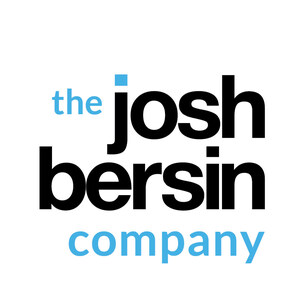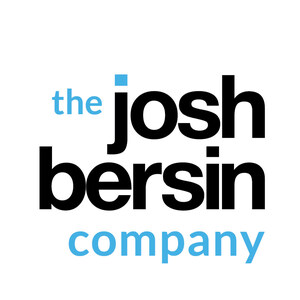
- Frontline workers represent 70% of the U.S. workforce but face significant challenges of high burnout, limited career advancement, and disconnection from their companies—creating substantial revenue losses
- Frontline-First workers report feeling neglected, overworked, and underappreciated, with 51% saying they "feel like a number, not a person"
- This report kicks off a series on the frontline workforce, accompanied by case studies, benchmarks, and other supporting resources
- Frontline-First tools and strategies drive significant savings and happier employees, from onboarding to offboarding
- Platforms like Galileo™ Suite could empower the workforce who interact directly with the public
OAKLAND, Calif., Nov. 5, 2025 /PRNewswire/ -- The Josh Bersin Company, the world's most trusted HR advisory firm, today releases new research highlighting the urgent need for a long-overdue shift in organizational thinking, embracing the needs of the frontline workforce, not just white-collar teams. Representing 70% of the global workforce, these employees are increasingly difficult to find, train, and retain—yet they remain the true drivers of customer experience and business performance.
The new analysis, Powering the Frontline Workforce: How Frontline-First Companies Thrive, produced in collaboration with UKG, reveals how the frontline workforce—the people who care for us when we're sick, welcome us at resorts, help us navigate bureaucracy, drive trucks, and stock the shelves that supply our food—despite their importance, are often overlooked. The result: 75% feel burned out and 51% feel like a number, not a person.
Exacerbating this challenge, economic uncertainty, combined with demographic and immigration pressures, is making previous assumptions about how easily leisure, healthcare, logistics, and other essential workers can be hired or replaced increasingly unrealistic.
To achieve Firstline-First success, the study recommends CHROs urgently prioritize their frontline workforce strategy to capture significant untapped business value and address what may soon be critical retention challenges.
The research finds that high-performing employers are adopting new "Frontline-First" HR strategies to support increasingly valuable hires across engagement, retention, workforce development, recognition, scheduling, and pay.
Frontline-First successes are already solidifying, including how:
- By providing frontline employees with targeted training, a provider of utility vegetation management and emergency storm response services firm cut turnover by 5%, saving $500,000
- Standardizing workforce management processes allows frontline workers at a major hotel chain to share and trade shifts easily, revolutionizing the company's hiring and growth
- Investing in training and expertise for its home improvement store staff has enabled a major retailer to drive both store growth and profitability.
AI is playing a key role in these and other successes, with conversational tools making it easier for traditionally classroom-resistant workforces to access guidance and complete core HR tasks like onboarding from their mobile devices while on the move or at work.
Powering the Frontline Workforce: How Frontline-First Companies Thrive is the first in a new Frontline-First series exploring this workforce segment's unique challenges and opportunities, with supporting case studies, benchmarks, and educational resources.
To better support frontline workers the Powering the Frontline Workforce report recommends:
- Adopting a Frontline-First mindset Invest in competitive pay, flexible work options, workplace safety, and clear career pathways
- Strengthening management Provide targeted development, peer support, and integrated workforce planning, scheduling, and employee engagement tools
- Unifying technology Connect payroll, scheduling, HR, talent, and workforce systems rather than maintaining silos
- Using data-driven insights Leverage insights to systemically improve business outcomes
- Harnessing AI Enable conversational employee experiences, dynamic scheduling, personalized coaching, and real-time feedback tailored to frontline needs
- Focusing on culture Understand workers' unique needs, to attract and retain staff
- Measuring impact Continuously track outcomes to optimize workforce strategies.
HR tech vendors are responding to this trend. The $40 billion global HR software industry has long underserved this segment of the workforce. While some siloed solutions exist for the 80% of deskless employees, the study notes that most HR systems are designed for office-based staff, creating a gap that was once widely accepted, but now poses real business risks.
A new breed of AI-powered Frontline-First solutions is emerging, designed for deskless workers and delivering substantial value for employees and employers.
The study highlights extensive market activity underscoring this growing awareness, reflected in how platforms such as UKG, a long-standing player in this space, along with Workvivo, Paradox, and SAP, are supporting the frontline workforce with dedicated capabilities in various processes. The stronger integration of HCM, payroll, and workforce management capabilities provides significant value to the frontline, simplifying the employee experience and creating stronger management insights.
Increasingly, organizations may turn to on-demand, mobile but fully-relevant HR agent solutions like The Josh Bersin Company's Galileo to help the Frontline-First agenda.
About Josh Bersin Company's new Frontline-First initiative
This report launches a new Frontline-First series on the deskless workforce, featuring case studies from leading brands, benchmarking data, and insights on hiring, retention, and industry-specific challenges across retail, hospitality, manufacturing, healthcare, and the services sector. The series will also explore how organizations can better integrate frontline roles into talent strategy, which HR technologies best support deskless workers, and how to build belonging and purpose among non–office-based employees.
Kathi Enderes, global industry analyst and SVP Research, The Josh Bersin Company, says:
"For decades, corporate investment, technology, and development programs have centered on white-collar workers. Today, leaders have to recognize that frontline workers—those in hospitals, retail, transportation, energy, and hospitality—are the true drivers of customer experience and business performance.
"Empowering frontline managers through digital HR support is not just a technology issue, it's a fundamental cultural shift that organizations must embrace.
"The frontline has become a true strategic asset—and overlooking its needs will increasingly amount to a competitive disadvantage."
Sarah Hodges, UKG CMO, says:
"Frontline workers are the lifeblood of the global economy — delivering essential services, building the products we rely on, and they are at the forefront of meeting the needs of customers, patients, and constituents. Yet too often, solutions aren't built with these critical workers in mind. At UKG, we're hyper-focused on evolving our Workforce Operating Platform with a people-first AI approach at the core to provide access to workforce insights and understanding that enable the frontline and the front office to better predict outcomes that drive business success and an improved employee experience. Research like our partnership with The Josh Bersin Company shows that when workers feel supported and in control, performance follows."
Josh Bersin, global industry analyst and CEO, The Josh Bersin Company's, says:
"Frontline workers aren't an operational afterthought; they're the heartbeat of growth, engagement, and customer trust. This is why we are so delighted by the launch of the Frontline-First research series, which, through in-depth reports and resources, will show how to attract and retain this vital and underserved part of the workforce.
"At last, AI is enabling HR to reach the store floor, closing the gap in how we support them. Tools like Galileo for Managers bring digital HR directly to supervisors, where the real work happens, while AI-based HR systems equip supervisors to manage, coach, and engage their teams more effectively in real time.
"It's time for organizations to urgently focus on serving the 80% of their workforce they depend on most."
To gain access to Powering the Frontline Workforce: How Frontline-First Companies Thrive, subscribe to Galileo Suite. More detail about the upcoming front-line research initiative can be found here and will be shared regularly on joshbersin.com
About UKG
UKG is a leading global AI platform for HR, pay, and workforce management. Unifying award-winning solutions with the world's largest collection of workforce data and people-first AI, UKG delivers unrivaled insights into today's workforce, helping organizations in every industry turn data into decisions that elevate productivity, culture, and the customer experience. Trusted by more than 80,000 organizations across 150 countries, tens of millions of employees — from small businesses to global enterprises — use UKG every day. To learn more, visit ukg.com.
About The Josh Bersin Company
The Josh Bersin Company is the world's most trusted human capital advisors, providing research-based insights on talent, leadership, and organizational performance.
Unlike traditional consultancies, we capture our integrated models, research, and guidance in a structured, scalable knowledge base—Galileo™—making trusted advice and decades of expertise accessible to anyone, anywhere, in real time.
With a dedicated team constantly tracking market change, testing ideas, and applying a unique business lens, we help over a million HR and business leaders address their most pressing people challenges—aligning work, knowledge, and skills for maximum impact. For more information, visit joshbersin.com.
SOURCE The Josh Bersin Company







Share this article